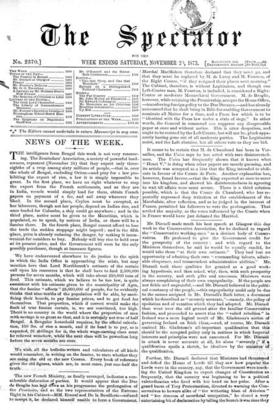Mr. Disraeli made much his best speech at Glasgow this
day week to the Conservative Association, for he declined to regard the " Conservative working-men " as a distinct body of Conser- vatives. He ptofessed to give the Government credit for the prosperity of the country and with regard to the Ministers themselves, he said he would be equally candid, he would take them "at their own estimate." , They had lost no opportunity of admiring their own " commanding talents, admir- able eloquence, and transcendent administiative abilities." Mr. Disraeli took these qualities for granted as a good work- ing hypothesis, and then asked, why, then, with such prosperity in the country, and such gifts and successes, Ministers were always complaining of their own unpopularity. lithe people are not fickle and.ungrateful,—and Mr. Disraeli believed in the politi- cal constancy of the people,—this unpopularity could only be due to the causes assigned in Mr. Disraeli's Bath letter; a doeument which he described as " severely accurate,"••--namely, the pOlicly of spoliation and of vexation which they had adopted. Mi. Disrael then went over the old ground after the familiar Comiervative fashion, and proceeded to assert that the "veiled rebellion " in Ireland was a mere logical result of Mr. Gladstone's notion of governing Ireland on Irish ideas,—and, of course, Mr. Disraeli - omitted Mr. Gladstone's -all-important , qualification that this should be the accepted policy only in matters in which Imperial interests and principles were not concerned. For Mt. Mira& in attack is never accurate at all, let alone " severely ;" if $ qualification spoils a sketch, he idealises by the omission`61 the qualification.






































